
Publisher:
Bonnie King
CONTACT:
Newsroom@Salem-news.com
Advertising:
Adsales@Salem-news.com

~Truth~
~Justice~
~Peace~
TJP
Feb-13-2010 12:14


 TweetFollow @OregonNews
TweetFollow @OregonNews
SPECIAL REPORT
Swedish Troops Clear Deadly Mines & Remnants of War
Tim King Salem-News.com
Exploding landmines and other dangerous remnants of war kill and maim thousands every year. But clearing these deadly threats requires a variety of complex skills.
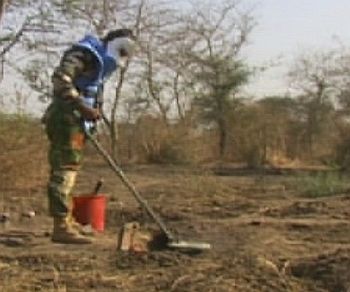 Photo/Video courtesy: UNTV and Salem-News.com |
(STOCKHOLM / SALEM) - ( At a camp, set up by the Swedish Civil Contingencies Agency, conditions in the field are recreated so United Nations staff can train.)
A militiaman shouts: “Open the door right now! Open the door or I’ll shoot! Open the door!”
Another yells: “What are you doing in this place?”
Tammy Hall is a Senior Technical Advisor for Mine Action: “We’re just setting up a coordination centre for the United Nations. We’re just humanitarian workers.”
A militiaman yells: “I already told you guys, we don’t need NATO, we don’t need UN. We’re loyal with our president. Just so you know, we will come back to you. We know where you’re at! Back in the car!”
While this may seem like the real thing these rebels are actually Swedish soldiers in disguise.
Just hours earlier, Tammy Hall, and other United Nations mine-action staff arrived in northern Sweden for a training exercise. They are being prepared for urgent deployment to war-zones.
Their task is to coordinate life-saving mine clearance and bomb disposal and to allow aid to reach those in need.
For the next 10 days, Tammy and her team will live in this fictional country called Sandland where a civil war has just ended.
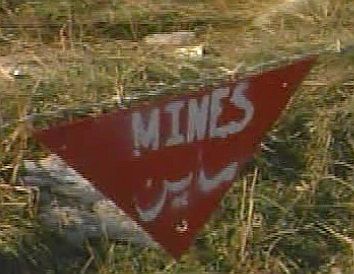 Afghan minefield near Bagram Airfield. Photo by Tim King |
Chris Clark is a Mine action veteran: “Sandland, our country, is divided along various ethnic lines.”
Chris Clark, himself a veteran of frontline mine-actions after ceasefires is head trainer on the course.
Clark said, “The individual activities or scenarios are all replications of things that have actually happened to our people in those environments.”
And learning how to respond is part of the training.
“For many of them it’s probably the first time they’ve had a gun pointed at their face and were told to get out of the car.”
As the smoke settles in the immediate aftermath of wars, it is often mine-action teams from the UN who are first to arrive on the scene.
I recorded these scenes in Afghanistan, of ordinance disposal crews clearing landmines near Kabul. Of all countries in the world affected by landmines, it is this nation that has the most, an ancient country where American and ISAF forces fight a current war, among the extreme dangers of one that happened here before.
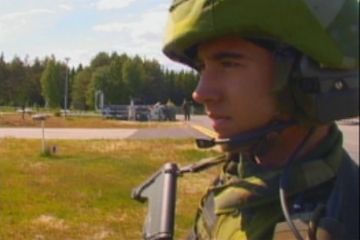 Soldier in Swedish UN mine clearance training |
In this remote village, red rocks mark an active minefield leftover from the Soviet War. We are told to stay behind the white rocks, locals didn't seem to care.
While Afghanistan has the largest number of landmines in the world. Here, vehicle convoys are instructed to never leave a marked road or drive off road at all.
Another country where U.S. and Coalition forces are still based, Iraq, has fewer. In many parts of Iraq, vehicles move freely where they want when necessary. A much larger problem is the IED, or improvised explosive device.
These roadside bombs have been the biggest fear in the two most recent wars. IED's and landmines are a deadly obstacle in the path of peace, and they are each something that all military forces, as well as civilians in these countries, as well as many others, have to try to survive.
Landmines, cluster munitions and unexploded bombs, kill more than 5,000 civilians annually, and maim many more.
Special report includes footage from Sweden, Afghanistan, Palestine & Iraq |
In more than 70 countries around the world, the threat from unexploded ordnance lives on for years after conflicts have ended.
At a camp, set up by the Swedish Civil Contingencies Agency, conditions in the field are recreated. But as Tammy and her colleagues set up a centre to coordinate mine clearance, their work is continually hampered by the lack of security.
A militiaman calls out: “Why are you not doing anything?”
In this scenario, the rebels demand immediate UN assistance to clear the cluster bombs littering their villages.
Tammy Hall said, “We have security concerns about our staff. Yesterday wasn’t a secure environment.”
Another militiaman states: “Security? We are the security. You come and help us and we have the area. It’s our area.”
Hall replies, “I realize that. Can you put the guns aside so that we can have a better conversation, honestly.”
Suddenly, things take a turn for the worse – a live cluster bomb.
The 'bad guy' tells Hall, “This is what makes the accidents for our people.”
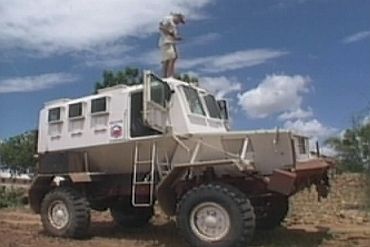 United Nations crew vehicles used in mine clearing |
A Senior Technical Advisor for Mine Action or 'MINURSO', Hall replies: “That’s why we have teams that are coming to clear that but they’re not here yet. We don’t have the capacity.”
But the rebels storm out leaving the potentially lethal bomb on the table, and the camp has to be evacuated.
Staff member Mark Williams states: “We have a security situation, everybody is to proceed to the area of the toilets now, over.”
Confusion reigns as they wait for the bomb-disposal team to arrive.
Williams said: “They’re pretty volatile things so we can’t afford for it to be disturbed in any way because if it does and it detonates then obviously we could have an accident and an injury.”
As the tent is sealed off, Chris comments on the team’s response to what could be, in the field, a very real situation.
Chris Clark: “They were a bit thrown by the fact that there were people there with guns in their camp . Of course, it’s a UN policy generally not to have guns in a camp but, de facto, they are here. Militia carry guns.”
During the next few days, the team compiles information in order to produce a map showing safe routes for the relief convoys. But their information is still incomplete.
 Sign in Kabul, Afghanistan underscores danger of minefields here. |
Then, help arrives in the form of another band of armed rebels, this time supposedly friendly. Their insider-info on the location of mine-fields could be exactly what the team needs in order to start getting aid to where it’s needed. Team-member, Mark Williams, agrees to meet their leader, a local warlord.
Mark Williams, a team leader, said: “We’re not getting as much information as I’d like and the only way we can get it is to perhaps negotiate with these guys”.
A rebel in the scenario states: “Unfortunately I have to blindfold you.”
Williams says, “When he put the hood on, I was a bit indecisive about what I was going to do.”
“I’d like to know any information you might have on any known minefields. What I’m gonna be able to do for you is to give you peace of mind that you can walk back into these fields, that you can go back to cultivating the land, or hunting.”
Williams said, “At the back of my mind I was just hoping I wasn’t going to be stuck down a well somewhere and just left to my own devices.”
The soldier portraying a Warlord spoke: “I will provide you with a map of the, known to us, minefields in this neighborhood. I hope that will help your organization to help my people.”
At last, the team can now start deploying clearance experts and making routes safe. This marks a turning-point in their training.
Max Kerley is the Director of UN Mine Action: “You probably learn more lessons from when you do badly during training than you learn from that which goes well during training.”
Kerley continued, “Better to do it here than wherever we next deploy the rapid response for real.”
And until the world is free of explosives leftover after conflicts, there will be a need to continue to deploy teams for real.
So is Tammy Hall ready to go?
She said, “I don’t think I was their star candidate but what they said at the end was they recommend me for a real mission, so on that ground, I think I passed.”
Clark says their project makes a real difference in the world, “Everybody I’ve seen in the exercise has certain attributes and those attributes can always contribute to a positive deployment. If you can get this absolutely right on the day, it has such a positive effect on the larger humanitarian response.”
=================================================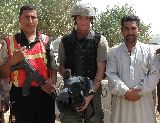 Tim King is a former U.S. Marine with twenty years of experience on the west coast as a television news producer, photojournalist, reporter and assignment editor. In addition to his role as a war correspondent, this Los Angeles native serves as Salem-News.com's Executive News Editor. Tim spent the winter of 2006/07 covering the war in Afghanistan, and he was in Iraq over the summer of 2008, reporting from the war while embedded with both the U.S. Army and the Marines. Tim holds numerous awards for reporting, photography, writing and editing, including the Oregon AP Award for Spot News Photographer of the Year (2004), first place Electronic Media Award in Spot News, Las Vegas, (1998), Oregon AP Cooperation Award (1991); and several others including the 2005 Red Cross Good Neighborhood Award for reporting. Serving the community in very real terms, Salem-News.com is the nation's only truly independent high traffic news Website. You can send Tim an email at this address: newsroom@salem-news.com
Tim King is a former U.S. Marine with twenty years of experience on the west coast as a television news producer, photojournalist, reporter and assignment editor. In addition to his role as a war correspondent, this Los Angeles native serves as Salem-News.com's Executive News Editor. Tim spent the winter of 2006/07 covering the war in Afghanistan, and he was in Iraq over the summer of 2008, reporting from the war while embedded with both the U.S. Army and the Marines. Tim holds numerous awards for reporting, photography, writing and editing, including the Oregon AP Award for Spot News Photographer of the Year (2004), first place Electronic Media Award in Spot News, Las Vegas, (1998), Oregon AP Cooperation Award (1991); and several others including the 2005 Red Cross Good Neighborhood Award for reporting. Serving the community in very real terms, Salem-News.com is the nation's only truly independent high traffic news Website. You can send Tim an email at this address: newsroom@salem-news.com
Articles for February 12, 2010 | Articles for February 13, 2010 | Articles for February 14, 2010
Quick Links
DINING
Willamette UniversityGoudy Commons Cafe
Dine on the Queen
Willamette Queen Sternwheeler
MUST SEE SALEM
Oregon Capitol ToursCapitol History Gateway
Willamette River Ride
Willamette Queen Sternwheeler
Historic Home Tours:
Deepwood Museum
The Bush House
Gaiety Hollow Garden
AUCTIONS - APPRAISALS
Auction Masters & AppraisalsCONSTRUCTION SERVICES
Roofing and ContractingSheridan, Ore.
ONLINE SHOPPING
Special Occasion DressesAdvertise with Salem-News
Contact:AdSales@Salem-News.com

googlec507860f6901db00.html



Terms of Service | Privacy Policy
All comments and messages are approved by people and self promotional links or unacceptable comments are denied.
Chuck Palazzo February 13, 2010 5:02 pm (Pacific time)
Good Stuff Brother, It really is amazing how much UXO has remained - even from WWII and on occasion prior. We definitely need more funding from Government as well as NGO's - Project Renew, here is Central Vietnam is a great example. The Vietnamese do the majority of the clearing, its a joint effort, and were trained and continue to be trained by former US EOD guys. Another sad remnant of war brother. Semper Fi and Happy Tet! Chuck
[Return to Top]©2025 Salem-News.com. All opinions expressed in this article are those of the author and do not necessarily reflect those of Salem-News.com.